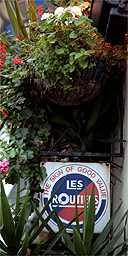
It began life as a guide for French truck drivers looking for good and fairly priced restaurants and hotels in the 1930s, and became a Gallic brand. In the UK the Les Routiers guide developed a reputation for featuring an eclectic mix of establishments, from fine restaurants to top gastropubs, cosy tearooms and even a particularly good fish and chip shop.
But now the British outpost of the Les Routiers empire may have reached the end of the road: there is no sign of its new hotel and restaurant guide, due out now, and its website is down. Nobody is answering the telephone at its London office and its directors are not returning calls. Across the country, patrons who paid to be listed in the latest edition are angry that they appear to have lost their money and frustrated that they will miss out on hungry and weary travellers.
Although there has been no explanation from Les Routiers in Britain for its disappearance, experts say restaurant and hotel guides are facing increasingly stiff competition from foodie websites.
Mark Vaughan, chef-patron of Vaughan's Bistro in Weymouth, Dorset, said yesterday: "It's a real shame. It's a high-profile and well-respected brand - that's why we joined. We invested a big chunk of our marketing budget in our membership and it looks as if that is lost."
It is particularly galling for Mr Vaughan as he was in line for an award from Les Routiers: "We were told we were in the running for the local food supporter prize and then we heard nothing more."
Paul Clerehugh, chef-proprietor of the Crooked Billet in Stoke Row, near Henley-on-Thames, said: "It's a legendary name and it's a shame to see it go in the UK. There was something quirky and interesting about it. They had everything from the fine hotel dining room to the pub in Leeds where they serve the best ham and pease pudding sandwich."
After 40 years of directing truckers and adventurous holidaymakers to gems in the French countryside, Les Routiers' red and blue logo arrived in the UK in the 70s. It fell out of fashion but the franchise was revived in 2000.
The original French ethos - to find interesting, individual places to stay and eat - was reborn and the team set about trying to get a Les Routiers guide in the glove compartment of every car in the country. Although restaurateurs and hoteliers had to pay for inclusion - most paid around £500 a year - a team of eight inspectors visited to check their establishments were up to the mark.
Its 2006 guide sold well and advance orders for the 2007 version were reasonable. But like the restaurateurs, the distributor, Portfolio Books, has been unable to contact Les Routiers in the UK, though its counterparts in France and Ireland are still going strong.
A spokeswoman for Michel Lafon, publishers of the French version of the guide, said: "Our next edition comes out in January. The English version is totally separate from us, so I don't have any information and can't comment."
Edmund Inkin, co-owner of the Felin Fach Griffin Inn in Brecon, Powys, said: "It's enormously sad but many people are now getting their information about where to eat and stay online. That is causing concern within the industry because it's open to abuse. Loose cannons can cause enormous damage to a place's reputation and, on the flip side, owners can get friends or a PR company to plant good reviews."
Some Les Routiers members did not even realise it had vanished. The Guardian broke the news to John Wild, who runs the Packet Bridge fish and chip shop in Bolton-le-Sands, Lancashire, which is famous for its Moby Dick - a large piece of cod - and battered Christmas pudding. He said: "That's a real surprise to me. It was nice for us, a fish and chip shop, to get in there.
"It's a pity if that's gone for good."

